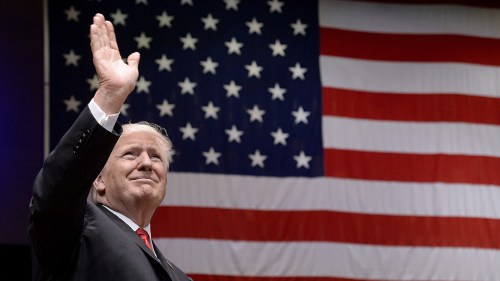How Tim Scott went from Trump challenger to Trump champion
This is part of The Hill’s ongoing series looking at Donald Trump’s possible vice-presidential picks.
Sen. Tim Scott (R-S.C.) has become a constant presence in Donald Trump’s orbit since dropping his own presidential bid late last year.
He stumped for the former commander-in-chief in New Hampshire, when Trump was looking to fend off a primary challenge from former U.N. Ambassador Nikki Haley. He praised Trump at a rally in Scott’s home state of South Carolina in February. And he has become a key surrogate for the former president on national television.
Now, Scott is considered one of the top candidates to be Trump’s vice-presidential pick in November; if that were to happen and they were to win, he would also become the first Black man nominated on a Republican ticket.
“Tim Scott would be a great choice,” said Brian Seitchik, a Republican strategist and former Trump campaign alum. “He was certainly qualified to be President of the United States, he opens up the doors to the Black community, who President Trump’s polling better in the Black community the cycle that he has previously, and Senator Scott certainly encourages African American voters to take sort of a fresh look at Donald Trump.”
Republicans argue that Scott would be an excellent strategic choice for Trump, not only because he could appeal to Black voters, but because of his humble roots in general.
“He’s not from an elitist background, he’s the average American,” said Charles Cogar, former legislative director for Scott. “He struggled as a kid and he knows that it took hard work, determination and opportunity for him to get where he is and so he really wants to make sure that everybody else has that same access to the opportunity and to the education. It’s part of who he is.”
Scott, the descendants of enslaved Africans, grew up in a single-parent home in North Charleston, South Carolina. His mother often worked long hours, and the family moved often.
In his autobiography, he recalls the night his mother, Frances, left his father, a Vietnam Air Force veteran. Scott was only seven.
“All I remember is the green shag carpet, the shouting, the sound of fists slamming into walls—and the conviction that everything bad that was happening was because of me,” Scott wrote. “I distinctly remember the feeling of pressure, as if some great weight were pressing in on my chest and squeezing down on my shoulders, making it impossible for me to find a deep breath.”
Frances moved 7-year-old Scott and his older brother Ben to her parents home in South Carolina.
It wasn’t the last time Scott faced struggle, who would grapple with challenges in school as well. As a freshman in high school, he failed four of his classes. Sometimes, he would find hate-filled notes in his locker, racial slurs scrawled on the paper.
But by the time he was a senior, he was elected student body president. After graduating high school, Scott attended Presbyterian College and earned his Bachelor’s from Charleston Southern University.
In 1994, Scott began a campaign for Charleston County Council. But when he expressed his interest in the council to the Democratic Party headquarters, Scott said, “they told me to get in line.”
So he ran as a Republican.
In 1995, he became the first Black Republican elected to any office in South Carolina since 1902. In 2010, Scott ran for the House of Representatives and became the first Black Republican from the Palmetto State to serve in the House since 1897.
When Sen. Jim DeMint resigned in 2012, Haley, then the state’s governor, appointed Scott to replace him. Scott became the first Black Republican senator since 1978 and the first Black Republican senator from the South since Reconstruction.
“Scott’s experience as a U.S. Senator and his positive, solutions-oriented approach to politics could significantly enhance Trump’s campaign,” said Whitley Yates, director of diversity and engagement for the Indiana Republican Party. “Known for his focus on economic opportunity, education, and criminal justice reform, Scott brings a compassionate and optimistic narrative that resonates with many voters.”
“His appeal spans across various demographics, including Democrats, Republicans, independents, white voters, Black/African American voters and Latino voters, indicating his potential to help Trump attract a broader and more diverse voter base,” Yates added.
Scott launched his own bid for the White House last May but suspended the campaign in November. Since then, he’s been campaigning for Trump, who indicated earlier this year that Scott could be one of his top choices for a running mate.
Trump has been working to build support among Black voters, a critical voting base for Biden.
Though polling by Pew Research Center shows a majority of Black voters lean Democratic, 18 percent would vote for Trump if the election were held today — an increase from 12 percent who voted for the former president in 2020.
Seitchik warned that a Scott pick won’t guarantee Trump will do better with Black voters on election day — but it could encourage them to take a second look.
But as Trump still hasn’t announced who his running mate will be, Seitchik said the biggest questions will be how aggressive and loyal the senator will be on the campaign trail.
“The job is twofold. Certainly the job is to be an attack dog-slash-counterpuncher, but there’s also a loyalty component here,” Seitchik said. “I’m assuming one of the questions Team Trump is going to be asking potential vice-presidential candidates is would this person do anything differently than Mike Pence did in January of 2021? I don’t know the answer to that question from Sen. Scott’s perspective, but the answer to that question, I assume, would be pretty important to Team Trump.”
Just hours after a violent mob attacked the Capitol on Jan. 6, 2021, Scott voted to certify President Biden’s election. Then, during a primary debate in August, Scott said then-Vice President Mike Pence “absolutely” did the right thing that day.
But when asked earlier this month if he would accept November’s results if Biden wins reelection, Scott declined to answer.
“At the end of the day, the 47th president of the United States will be President Donald Trump,” Scott said.
Copyright 2024 Nexstar Media Inc. All rights reserved. This material may not be published, broadcast, rewritten, or redistributed..



















